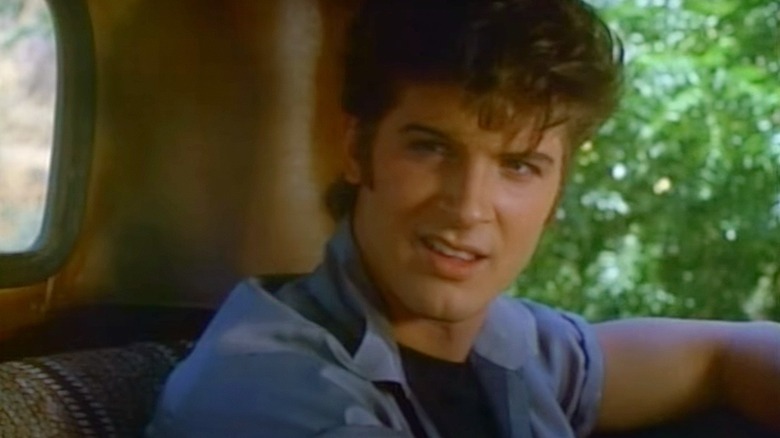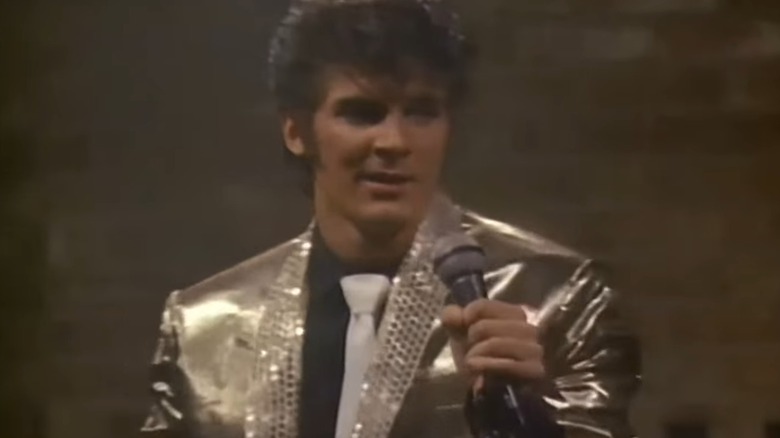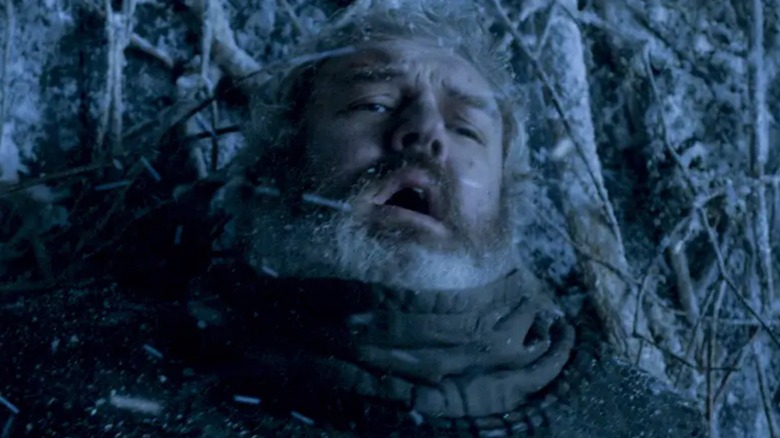George R.R. Martin Co-Wrote A Forgotten Twilight Zone Episode About Elvis
Before he wrote such memorable lines as, "A mind needs books as a sword needs a whetstone" and "death is so terribly final, while life is full of possibilities," novelist George R.R. Martin helped pen another instantly quotable turn of phrase: "It's rock and roll, you dumb son of a b***h!"
This quote is hilarious on its own, but even funnier when put in context: it comes partway through a now-forgotten episode of a once-popular "Twilight Zone" reboot series that aired from 1985 to 1989. The speaker of the quote is Gary Pitkin (Jeff Yagher), a spot-on Elvis impersonator. The subject of his ridicule? It's the King himself, also played by Yagher in a time travel plot that sees the two men come face to face on the eve of Elvis' first studio session. It doesn't go well. The episode, "The Once and Future King," was written by Martin from a story by Bryce Maritano.
Incredibly, this strange story about two Elvises is one of the first TV writing credits to Martin's name. The future "A Song of Ice and Fire" novelist reminisced about writing the episode in a blog post last year, revealing on his Not a Blog website that he spent 14 years writing short stories and novels before giving TV a shot. "Much as I enjoyed television, I never dreamt of writing for it until 1985, when CBS decided to launch a new version of 'The Twilight Zone,' and executive producer Phil DeGuere invited me to write an episode for them," Martin wrote in a post supporting the then-ongoing WGA writers' strike.
Martin got his start in TV on the Twilight Zone reboot series
While Martin doesn't mention "The Once and Future King" by name here, in another blog post he says that the late author and screenwriter Harlan Ellison proposed he work on rewrites for the episode. Martin penned five scripts over the course of a season and a half of the series, starting with the episode before the Elvis one: the season finale "The Last Defender of Camelot."
His input extended beyond the words on the page. "I was deeply involved in every aspect of every one of them," Martin explained. "I did not just write my script, turn it in, and go away. I sat in on the casting sessions. I worked with the directors. I was present at the table reads." He also noted that he got to sit in on stunt rehearsals, watch dailies footage, and catch some of the editing process. It was a holistic approach to making TV that he argues is rarer today due to the "mini room" writing trend.
With decades of retrospect, opinions on "The Once and Future King" — and the '80s "Twilight Zone" reboot as a whole — remain mixed. There are several Reddit threads and forum posts that call the episode one of the best of the reboot series, but it isn't actually ranked as one of the highest-rated among fans on IMDb. The entire series isn't available on streaming, making it tough for new fans to decide whether or not the episode is worth the watch. But having seen it, I can attest that it's an inadvertently silly slice of high-concept storytelling featuring two great performances by Yagher.
The Once And Future King has a very Martin twist
The story escalates quickly, injects a classic "Twilight Zone" twist, and ends on an ironic note. It also seems nothing like the writing "Game of Thrones" fans might expect from Martin – aside from one deadly plot point (complete spoilers for the episode follow). After letting slip that he knows all about Elvis and failing to convince him that he's actually his dead brother, Gary accidentally insults Elvis' mom, leading to a fight between the two. In an unbelievable twist of fate, Elvis dies, and after quickly disposing of his body, his future doppelgänger decides to use his superfan knowledge of Elvis' life to take his place, living out his highs and lows as an act of penance for accidentally killing him. Sure, why not? The more bonkers Elvis stories, the better.
Martin spoke about the difficulties of writing adaptations in an interview with Time, noting that in his first-ever episode of the show, he was asked to choose between including two pricier elements that had been in the script. Always attentive to the storytellers' perspective, Martin called up the author of the short story he was translating to screen to ask which of the two he preferred. When it came to portraying Elvis, though, the show apparently consulted with someone who was even closer to the story: the deeply odd episode ends with a title card thanking the Presley estate for their collaboration.


